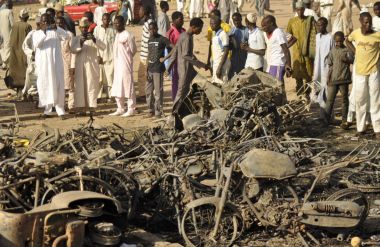Nigeria: Eight wounded by suspected Boko Haram attack on church
A suicide bomber has blown himself up at the gates of a church in Nigeria, injuring eight people.

While no one has claimed responsibility for the attack, it bears the hallmarks of the Boko Haram Islamist terrorist group.
The church in Gombe, north east Nigeria, is a congregation of the Evangelical Church West Africa, now known as Evangelical Church Winning All (ECWA). The attacker rode a motorcycle up to the building and refused to park it outside a security barrier set up by volunteers from the church. Dahiru Badamasi, who lives in the neighbourhood, was quoted by AFP news agency as saying: "He insisted on riding through the barrier. It was while he was arguing with the volunteers that his suicide belt exploded."
The attack on the church was the second in Gombe in two days. On Wednesday, 11 people were killed when a bomb went off on a bus heading from Gombe to neighbouring Yobe state.
The attacks probably represent an expansion of Boko Haram activity, which until now has focused on the three states of Yobe, Borno and Adamawa. Last November the group attacked a mosque in Kano, killing at least 130 people.
President Goodluck Jonathan, who is facing elections in February, is under severe pressure to deal with the insurrection. He said yesterday that he would re-equip the armed forces "to enhance their capacity to win the ongoing war against terror and insurgency".
"We will bring justice to the savage terrorists known as Boko Haram. They will be defeated," he said.
"We will not forget. We will not look the other way."
However, Nigeria has struggled to combat the terrorist group, with its under-resourced army overwhelmed by the challenge and itself accused of committing serious violations of human rights including torture and murder.
Boko Haram has captured scores of towns and kidnapped hundreds of women and children, including the 219 Chibok schoolgirls whose plight made headlines around the world. According to a New York Times report, American attempts to assist the search for them with drones and military advisers have failed, in part because of the distrust between the two armies. It cites officials at the headquarters of the United States Africa Command describing a "corruption-plagued, poorly equipped Nigerian military that is 'in tatters' as it confronts an enemy that now controls about 20 percent of the country". One American official who spoke on condition of anonymity said: "Ounce for ounce, Boko Haram is equal to if not better than the Nigerian military."











